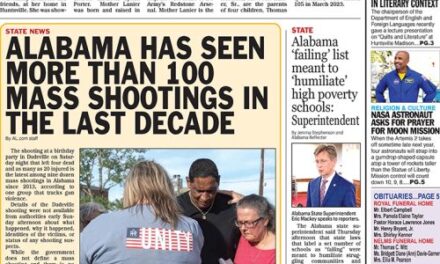By Aria Brent
AFRO Staff Writer
abrent@afro.com
Black church leaders are working to keep its members and the Black community at large supported, unified and informed as injustice continues to impact marginalized groups across the nation. With the historically integral role of the Black Church in mind, a group of faith leaders from across the nation have created a credo speaking against Project 2025 and White supremacy, all while encouraging Black collaborations to boost the community.

CREDIT:Unsplash / Ben White
Citing both the Bible and historical Black figures throughout the document, it was noted that this credo was not created as a reaction to the blatantly racist agenda of Project 2025, but instead, as a response to the ongoing tolerance and alignment of White Christian Nationalism with the current presidential administration.
The Rev. Dr. Joseph N. Evans is the J. Alfred Smith Sr. Professor of Theology in the Public Square and director of the Center for Truth, Racial Healing, and Restorative Justice at the Berkeley School of Theology. As one of the faith leaders who contributed to the creation of the document, he recently spoke with the AFRO about the credo and what inspired it.
“It came out of our disappointment that the nation did not elect former Vice President Kamala Harris to the presidency. The nation chose authoritarianism over democracy. It chose White mythology over democracy,” he said. “That created a climate for us to accept that no one is coming to help Black people, other minorities and other marginalized people. We had to find a way to speak to our people about what we believe. The credo emerged as an ethical vision to create dialogue, discussion, debate and hopefully strategic action plans.”
Evans explained why it was important for the credo to be a collaborative effort.
“One person could not speak for what we call the ‘legatees of the Black church tradition.’ And although we have some of the most significant faith leaders in the nation today who have signed the initial document, we believe that the document will be implemented in other locations,” said Evans. “There will be people who are going to think of ideas. It’s always better to work collectively than individually.”
The 10-page statement shares a series of beliefs and thoughts concerning local and international topics, including the war in Ukraine, the importance of investing in the Black Press and the unreliability of mainstream media, the prioritization of Black mental health professionals when confronting the mental effects of White supremacy, and the support of a two-state solution for the war between Israel and Palestine.
Local faith leader, Rev. Dr. Kevin Slayton, is also helping push the message of the credo.
“I think right now we’re in the initial stage, which is getting the credo into the hands of faith leaders across the country– particularly those who are leading traditionally African-American churches,” said Slayton. “We are familiar with the necessity of expressing some form of resistance in the public square, but oftentimes we don’t know what we don’t know. We have to remind one another of our history.”
Slayton said it was crucial to spread the information within the credo “not just to faith leaders of color” but also to “the hearts and minds of people of faith in our community.”
At the root of it all is the need to unify the Black community.
The document notes the importance of sending students to historically Black colleges and universities (HBCUs) and doing business with Black financial institutions to leverage Black income and wealth. The authors are calling for increased opportunities for future generations.
“We believe our collective finances will support ‘Africa is Rising,’ the largest and youngest
population in the world. By 2050, Africans will be 1 in 4 people on the planet,” the credo reads. “We believe it is necessary to invest in Black banks and other Black financial institutions to create higher education and vocational scholarships that reinforce our expectations of our forthcoming generations.”
The credo also encourages all “college-eligible Black students to seek admissions, enrollments, retainment and graduations from Historically Black Colleges and Universities.”
It encourages “all students who seek high paying vocational professions” to “enroll into credentialed schools that offer internships that better prepare our children to make noble contributions to their families, societies and communities.”
“In addition, local, state and national governments must provide equitable educational opportunities for all students beginning at pre-kindergarten…”
Evans recognizes that it’s going to take a massive effort for the beliefs of those responsible for the writings of the credo to reach the masses. Moreover, he knows the work that needs to be done is not going to happen overnight. Nonetheless, he and the other clergy stand firmly on the credo’s principles and the merits of the movement.
“We don’t expect that this is going to get to everybody in a short period of time,” said Evans. “We have to do this over months–if not years.”
To read the credo, authored by members of the faith community nationwide, and to sign your name in support, please click here.
The post Leaders call for faith community to organize against White supremacy with new credo appeared first on AFRO American Newspapers.









